


God would have sent us Mark Van Doren.
If our greatest need had been transportation,
God would have sent us Henry Ford.
If our greatest need had been money and wealth,
God would have sent us the Rockefellers.
If our greatest need had been pleasure and entertainment,
God would have sent us Walt Disney.
If our greatest need had been communication,
God would have sent Alexander Graham Bell.
If our greatest need had been power and government,
God would have sent us Augustus Caesar.
If our greatest need had been high fashion,
God would have sent us Christian Dior.
If our greatest need had been architecture,
God would have sent us Frank Lloyd Wright.
If our greatest need was financial management,
God would have sent us John Pierpont Morgan.
If our greatest need had been skyscrapers,
God would have sent us Arnold Trump.
If our greatest need had been expert juggling and humor,
God would have sent us W. C. Fields.
If our greatest need had been glamour,
God would have sent us Greta Garbo.
If our greatest need had been thrills and stunts,
God would have sent us Ringling, Barnum and Bailey.
If our greatest need had been literature,
God would have sent us William Shakespeare.
If our greatest need had been genius and scientific discoveries,
God would have sent us Blaise Pascal, Isaac Newton, and Albert Einstein.
If our greatest need had been art,
God would have sent us Michelangelo.
If our greatest need had been politics and reform,
God would have sent us Gandhi.
But our greatest need was simply forgiveness,
so God sent us a Savior.
--“God Sent Us a Savior” Revised, Hallmark Cards, Earth Museum Artifact, IRA SULKOWSKY Archive, #12940, ARGO IV Expedition




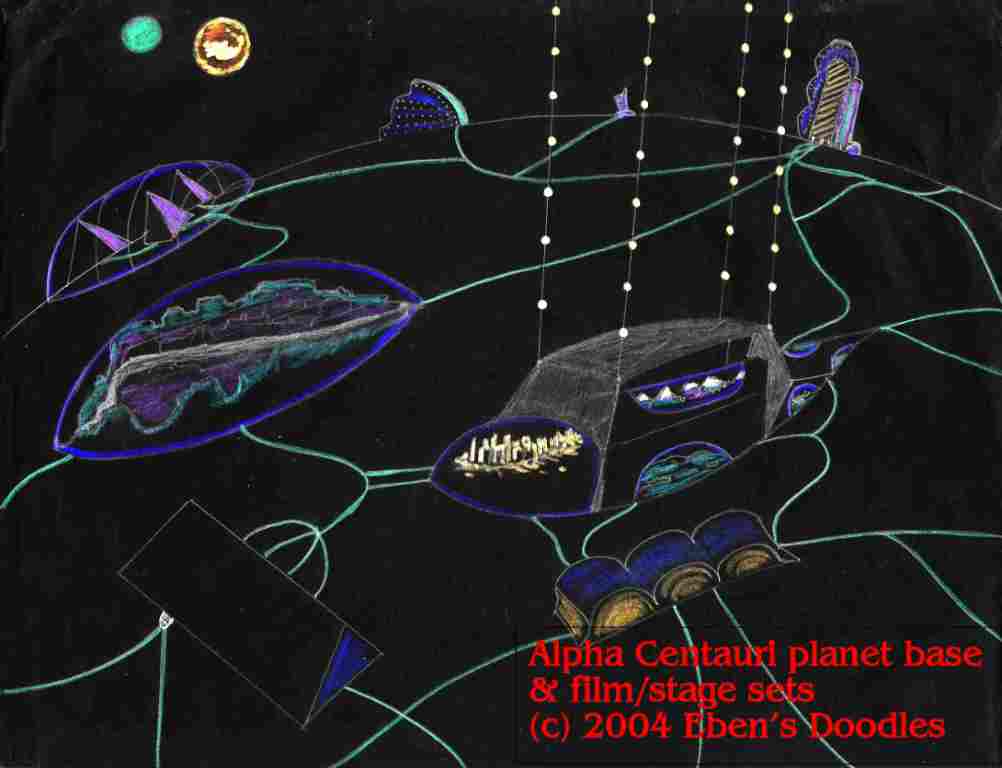

The first thing the colony did, in fact, was build the first prototype of the present dome, but it was far more sophisticated. It did not rely on "heavy metal" infrastructure but atomic and subatomic structues that performed the same functions as the original geo-domes.
That was on a planet in the Alpha Centauri system, of course--before the First Evacuation. Events had forced them off the planet, and they had left the dome behind, but at their next landing they immediately set to work on a second dome-shield more elaborate than the first. They knew then what more they wanted in a dome after testing and experiencing the first. One fortunate thing about airless worlds with low gravity, the domes were wonderfully easy to construct--contrasting with the huge expense and difficulty experienced on Earth. Using nano-tech and chemistry and other biological sciences, they found they could build structures vast in size for a fraction of the time, effort, and cost--and so they did, in order to re-create Earth as far as possible.
Mental and emotional well-being, sanity, happiness--things like that--depended on re-creating Earth. No human being, they found early on, could live very long without a reasonably good facsimile.
If domes of a size to cover whole Earth-sized continents were achievable, and of a refinement and complexity that could fool you most of the time into thinking you were back home on Mother Earth, wasn’t that enough to make a colony of displaced Earthlings viable? Alas! It didn’t work that way. Being fooled most of the time was not good enough. With everything so controlled, there was bound to come those moments of dread and stark, cold misery when a resident saw through the wonderful sham--then what? It usually took months of intensive psychotherapy to restore that person to a somewhat viable, functioning human being. Many simply couldn’t be helped and committed suicide.
Clearly, the colony could not go on this way. They had a crisis on their hands that no one had reasonably defined and handled. All the space exploration nuts and experts were quite wrong and had mis-figured their humanity’s potential for space travel and life in space. The renowned Isaac Asimov, Georges F. Csygynski-Mygorny, Count Zsmathmary (for some reason, Hungary produced a disreportionate number of the world’s futurists), Brooke Ashe III, and others had miscalculated by overlooking man’s basic unadaptibility. It wasn’t physical at all, which, naturally, “natural science”--minded specialist could not grasp with their irreligious, scientific-mechanist training.
Contrary to their preconceptions, man was never a “space animal,” and the Alpha Centaurii soon were made aware of the dismal fact. Moreover, he couldn’t be fooled indefinitely to think and feel he was on Earth when he was not.
Travelling from point to point in space was acceptable to the human organism and human spirit-- human beings could accept the sacrifice that involved if they wanted to do it badly enough. But living indefinitely away from the home planet was another. It did not matter if the emigres were second, third, or even fiftieth, or 10,000th generation. The initial problem of exile--for that was how the human being reacted to it--was always active.
What to do? How could a colony be kept going without everyone going mad and killing themselves and each other? This wasn’t the polar “Shangri-la” of Sweden, where the people usually had the means of leaving it for at least the winter and going to warm, sunny places on Earth to recuperate and recharge their pyschological batteries. Where could they go?
Unfortunately, anything they contrived was just that--a contrivance. Failure was written into every “solution” by the fact it wasn’t “real,” “Earth-based,” “Earth-generated.” So they did the next best thing and only workable thing--they re-created Earth under a vast Geo-Dome, but they also launched the “Cultural Challenge Renewal Program”--or CCRP.
Workable, at least CCRP kept the insanity and suicide (I-S Syndrome) Rate within “acceptable levels.” I-S remained, to put the case as it was, horrible but not catastrophic. Remained that way--that is--until the discovery of the Sulkowsky archive in the 11,000th Century.
Whatever it was, the colony, once it embarked on the new material, could never go back to what it had been. Another odd, unexplainable thing was the archive concerned, was centered around, one celebration, one festval, called “Christmas Factor.” As the colony activated one part after another, the “Christmas Factor” began doing things to the participants--something over a billion Alpha Centaurii, who were all involved either building the next set or running the current one, or else working as “real-life” people on the online set. The effects began to spill over into the partipant’s next set, and on to the next. People began changing, and they couldn’t stop changing. They began--we must say the word again--”hoping.”
Hoping for what? What did they have to hope for, in their circumstances? Could they have begun the dangerous, exceedingly dangerous process of hoping for a Way Out? A Real Alternative to endless charades? A Pleroma? A Parousia? Whatever the thing hoped for might be called, where the Alpha Centaurii--fatally bewitched and inspired by Ira Sulkowsky’s “Christmas Factor”-- were they now sailing into the reef-studded but measureless depths of what Catherine of Sienna called “the Sea of the divine Trinity”? or, to put it another way, the oceanic Magnum Mysterium, not only of his Nativity, but the Godhead that had once created such “uncontrollable mystery on a bestial floor”?
Truly, for the A-Cs, with the East Gate of Paradise Regained looming ahead, this was NATAL CONVERGENCE...
Subfile A1: “Dogon Star Child”
They in turn signalled via the controlling computers, and the latest, new cultural series began. Everyone was so well trained, practically since birth, that changing from one set to another was, with superlative pyschologists, easily done without too many people experiencing “Post-Habitat Trauma and Retrogressive Emotions/Recollections Syndrome.”
Of course, there were always some that had to be “left behind,” or set aside until their thought patterns and emotions could be stabilized.
But most people wanted to go on, to be “challenged,” and without this active, volunteer spirit, the whole program would have collapsed millenia before and the colony, undergoing rigor mortis and stagnation, would have self-destructed.
Heena, the woman playing Yeshua’s expectant mother, for example. She had been “left behind” the last time, and while undergoing extensive therapy in the Reconditioning Center had missed the Czar-era habitat that restaged the Romanovs, Rasputin, and the Russian Revolution. What a pity! From producer down to the smallest bit part player, the whole thing had gone fantastically well, and everyone participating had received, for reward, a sort of new lease on life. But now, her mind back together, she was determined to do her best.
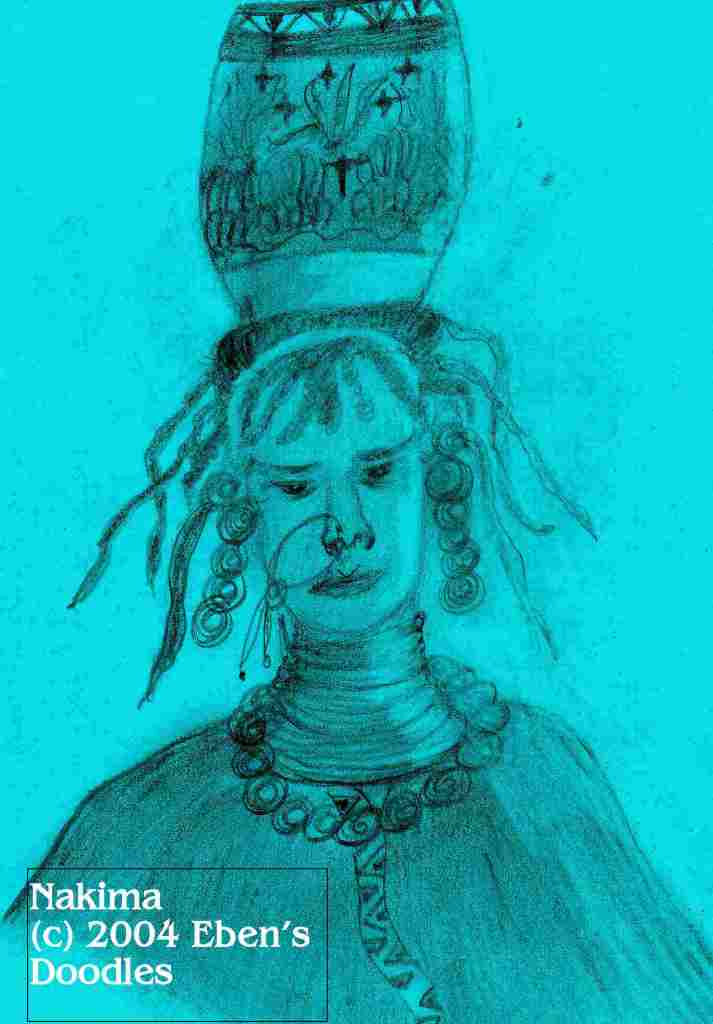
She wouldn't worry about hyenas now, but would the panthers attack her? Not at this hour, she knew. They had finished their nightly hunting, and except for a wounded or old and weary panther slow on returning home, there was no danger she could see. The snakes, particularly the black cobra, would stay hidden too in their clefts, for there was yet too much coolness in the early morning for them to stir out of their warm holes.
She let down the fine, twelve-starred jar and watered her secret garden.
Day after day she had watered the bit of good ground after planting. Crouching down on her haunches, she examined the ground carefully in the growing light. Had the seed sprouted? No? Well, she would just keep watering until she saw the tiny green fingers poking through the red soil. She had the water, the seed-corn was in the ground, she knew, so there was no doubt in her mind that this ground would produce for her. Other gardens she had kept in the hills like this one had produced, but the soil was not so rich and deep, and she expected more than a basket of corn come harvest.
She rose heavily, with greater difficulty than formerly. The baby was coming soon, she knew. Even now it was kicking at her stomach. Her hand over the spot, she felt the tiny foot pushing outwards. Push! Push! Push!
What a strange child this would be! she thought. It was not conceived as a normal child, for she was, she knew, a virgin. Her betrothed, Hakuram, had not touched her. He was a good and sober man, and...
“What do you mean, you are with child?” he had questioned her, his hand gripping her hand too hard for comfort where they stood just around from the village gate.
“It had happened to me in this way,” she explained. “The Angel of the Lord came to me, and I was afraid and hid my head and--” She had told him the entire thing, how the Angel had announced that she had been chosen among women to bear the Son of the Most High, and that he was the Savior, the Messiah and Deliverer that would set all people free from their wrong deeds.
Since her people had held the Desire of all nations in in their hearts ever since the star knowledge had come to them, what else could she desire than to be God’s vessel? Every child-bearing woman in Dogon desired it? Even the little maids--
Hearing her words, Hakurum, who had always been a man of slow, reasoned speech was silent for long moments. She must have watched the swallows circle many times over the village before spoke.
“I believe you!” he blurted out finally, forgetting to keep his voice down. “We’ve been children together. You always told the truth. But I must think about this. It requires man’s thought alone. I will go into the hills where the star-men abide and think what I must do--do with you. Maybe one of them will counsel me. Here, the others will talk, and they will each say something, until I am all muddled in my head. And they will become very angry, for they will not believe you have been chosen by the Most High. They will come with the elders and stone you for betraying the betrothal bonds.”
Recalling how Hakuram had received her account without dispute but still troubled by it, she stood looking back toward the far village. She wondered if Hakuram had returned from the hills--not these little stone hills back of her village but others, great red mountains, three days’ long journey to the north where still some holy star-men, from the Dogon and other peoples, lived in caves.
People were beginning to talk, questioning why he should go away, when he had not announced a choice to become a star-man. Wasn’t life holy enough among his people for someone more fitted for a common trade and ordinary livelihood like the rest? Whenever family and friends asked her, she said it was Hakuram’s matter, his decision, and they should go ask him themselves why he had taken to the hills. That didn’t satisfy them, but it was the only thing she could say without telling them everything.
She knew it was time to go when the night moon had all but crept away. Already tall blue wisps of cooking fires were climbing into the pale pink and golden air where the first king-swallows were circling, telling her it was time to return to her parents to begin the morning chores. Her bare feet swift and sure on the hard-packed, bare ground where not a green stem of grass ever grew, Nakima returned home.
She had just reached it when the day moon blazed above the horizon, turning the whole sky to red and gold.
Hakuram, as she half-expected he might, stood by the village gate, his eyes lowered in his characteristic way as he thought deeply about something.
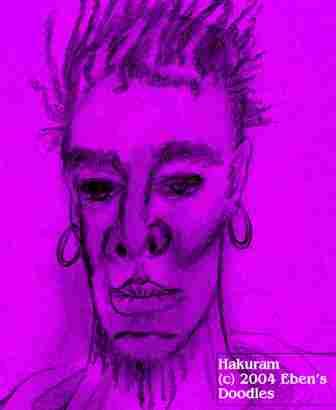
Her mind whirling, Nakima parted company from her betrothed and turned into her parents’ high-walled hut with the beehive cone roof of thatch.
Hakuram turned to his other family hut, which fronted on the open market served as a carpenter shop.
He almost expected to meet his father’s gaze as he stepped into the part that functioned as the shop. Pausing, he looked down and found his father’s slippers, full of sawdust, lying where he always kept them. Neither he nor his mother had the heart to dispose of them to the needy. How he had suffered from carpenter’s lung--yet kept working, working until his hands could no longer hold the tools between his coughing spells!
His mother, her hands smeared with ash from cleaning the hearth and getting a fire started, looked quickly into the shop and her eyes, full of sorrowing, warmed with the sight of him. She had lost her husband and provider, yet this son was a mighty one and would surely look after her in her old age! Soon she might hire a girl to do the dirty, hard tasks and rest her bones!
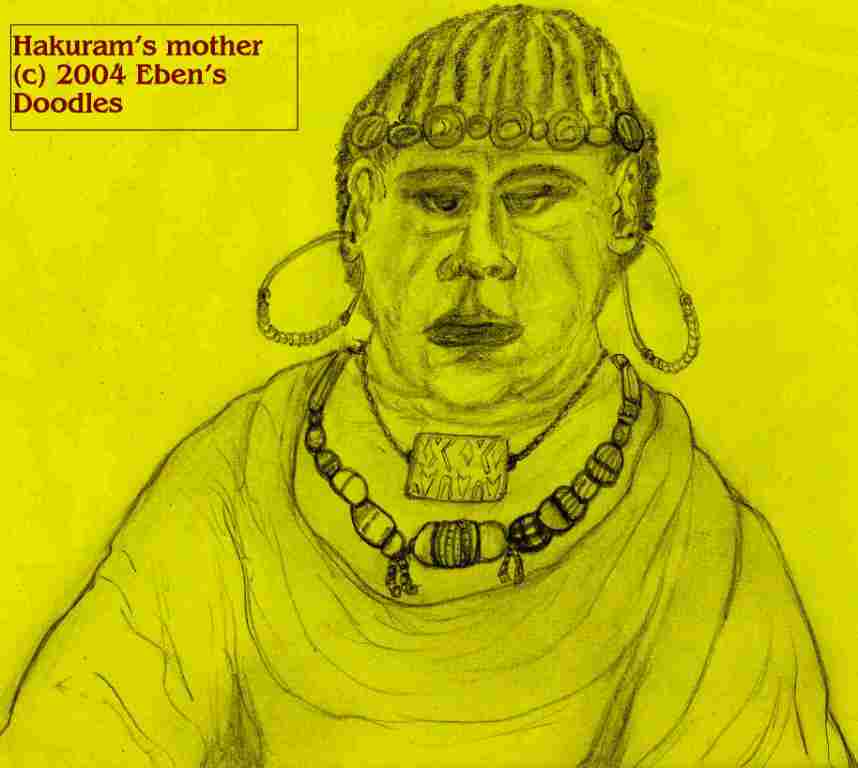
Since it concerned business, now it was her chance. “Are you going to do aunt’s chair today or something else, son of Esefpha? How about uncle’s plow. He will need another one soon as the old one is no good, I hear, and he is complaining about the cost of a new one and--”
Hakuram never glanced up from work. He kept steadily at it until it was finished.
His mother, not put off, went away to her own work but looked back in from time to time. She brought him finally his breakfast, a corn patty and some sliced tomatoes and, because she was overjoyed to see him back home, several dried figs from the special jar her mother had given her.
Not to appear too silly, she looked at the item in progress and knew he didn’t have either a chair or a plow in mind. It was much too long for a yoke, and looked like a drinking tube or an elephant’s nose! This was too much for her. She had to ask about it.
“For whom is this, son?”
Hakuram shook his head slightly, still working hard. He hadn’t time to answer questions, nor would he about anything he had in hand, and this was even more reason not to tell her and the whole village of aunts, uncles, cousins, and their respective relatives. Let them discover it in time, he decided.
Her eyes bright but just as determined to find out as he was to keep the matter discreet, the widow slipped away, leaving his breakfast. After a time he bolted it down, then went back to work. The widow came back in the shop, stood observing him work though the day was ending for such work, and sighed and went back to her weaving and cleaning. She interrupted that a while later by bringing him a piece of bread, a fat leek, and cheese, his last meal of the day. As before, he ignored it and would not stop what he was doing until he seized a moment to eat.
The night came on, and she went to bed, but Hakuram did not go to his, which he had in a corner of the shop. She had made sure of it by listening toward that spot, and the thin wall would have told her if he had lain down. Instead she heard the contant sounds of his tools on the wood of the limb he had hollowed in his expert way to make a long tube.
Finally, she heard a crash and several hand tools roll, then silence.
Darting up, she wavered on the shop entrance. Should she?
Moving the curtain aside, she looked into the gloom, but heard only the measured breaths of an exhausted man. He must have gone to sleep where he had fallen on the floor, she decided. Slipping in, she put her wool shawl over him, which was so long for a widow that it could serve as a blanket against the chill.
Going back to her cold, husbandless bed, she sat up, her eyes watching in the dark for quite some time.
....”No, the star-gazing eye is not finished!” the sleeping Hakuram told the star-man who had come to the shop. “ I must have more time! I need the crystal that goes in the eye-piece, and there is none like that here in our village. I have given word, and a dealer in stones who passes through here will look for one like it in the next villages. It may be months.”
But the star-man came again a short time later. He wasn't as shining in the first dream, until he parted his cloak. Hakuram grew more upset. He bowed many times. “No, it is not ready. There is no crystal for the eye. We must have it first before the work is yours. Can you not wait? I have done all I can, sire!”
A third time the star-man spoke as Hakuram began to protest. “The Seeing Eye will not be needed. A star will be sent, of the glory of God, that all can see plainly, and so this work of yours will not be needed by anybody. The one who wants it will be coming soon to this village, but he will not be seeking what you have made. So rest, little brother. Rest!”
Hakuram lay still for a moment where he had just been tossing and turning, and then he bolted upright, his eyes like saucers. Running hands through his hair, he got up, feeling his work bench, stepped over, and unbolted the door. He peered out quickly, but moonlight showed only a cur scatching itself and yawning. No one was about yet--it was the dead of the night.
He heard his mother stir in the other room. Too late he went to lie down on his bed in the corner. Her voice came to him.
“Son? What is the matter?”
He could not avoid it. His heart was bursting, and he could not contain his words as he could during the day. “An angel came to me again!”
The widow hurried to him and sank down, feeling until she grasped his hand.
“Tell me all! You cannot hide what is going on from your mother!”
How true! And the son was bursting with desire to tell someone. Why not the one whose womb had carried him?
His voice stumbling, his eyes roving the darkness, he began. “It was like the first time, only I thought it was a customer the first two times, and then he revealed himself, casting aside his outer robe, revealing the brightness of an angel of the Most High! He said--he said--”
“Yes? ‘He said--’?” she prompted him, though his voice was really too loud, and others might be listening in.
“--the Seeing Eye would not be needed.”
The way his voice dropped into such a matter-of-fact tone made the widow’s heart sink. Surely, that was not the end of the matter, after so glorious a visitation? She was very disappointed. After all, if this was the second such visitation, she had missed hearing already about the first! Why were her men so hard of speech? Why must she pry, pry, pry just to extract a crumb now and then? People were always questioning her about this and that, and she almost never had anything to say, which made her look so empty-headed and ignorant--but what could she do?
She couldn’t help it. She pressed his trembling hand to her hard and withered face.
“But why did you make it? It cost you many hard hours! That isn’t good business practice!”
Hakuram sighed. “I was asked by a holy man in the hills of the stars, who has knowledge of the stars of our people. His eyes are failing, and he thought it might help, since the stars are moving toward the place where they will village together, he said, and he wanted to observe them at that time. He said he would come for it, but now there is no need since--”
The widow could not believe so many words, and she was not about to disturb his caravan of thought, so she waited, holding her breath.
“--since something is going to happen here soon, the angel said to me.”
“What may it be, son?”
His eyes widened as he realized what she was saying. “Why, God-Is-Villaging-With-Us, that is His holy name, and He will be born of a virgin here among our people--you know, my bethrothed!”
The old woman rose up with haste. That wasn’t, for her, a pleasing reply. Holding her hand over her mouth, she fled away before she said something a woman and a mother of her family might regret all her days.
Despite all misgivings and doubts concerning the matter, it happened as the angel promised. To confirm it with a sign, a brightness like a star came from the heavens and stood over the place of the chosen virgin--illuminating the Nativity of God-Is-Villaging-With-Us, or Immanuel. Nothing like it had been seen before. Star-men ran down from the hills and mountains to see it better. And some came with fine and costly gifts, extolling the Child in terms reserved for royalty.
Immanuel reigning in their midst, the Dogon were never the same again.
Here the canvas ran out of material, and the CCRP also had to stop, momentarily, while the second file activated. Some of actors and actresses--better at making quick changes of scene, character, and clothes--stepped quickly from one set to the other without fuss or difficulty. Not all could do this, however, and Yeshua’s mother was one. A stand-in for her part on the next file presentation was called by the producer, for she evidently wasn’t up to going on just now, since she was hanging back on the old set, staring into space, a strange, Mona Lisa-type smile on her face. When she did stand up and start walking, she didn’t go to the next set via the convenient rocket chair in the planet-wide, transit tube system no, she went out beyond the set’s perimeters and stood, staring up at the dome, or rather, through it, as if that were possible.
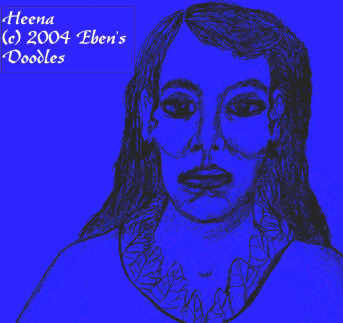
She knew that. Everyone knew it. Why then did she waste her part in the next file and stand staring up into the dome, as if searching for Something?
The right personnel approached her, of course, and started a dialogue, but it wasn’t satisfactory.
“What’s wrong, honey?” the Psych-Rehab woman asked gently, using her best manner, not too fast, not too diffident, but mixing the right elements of confidential tone and friendliness and a hint of motherly concern.
The actress turned, but her eyes were still gazing upwards. “Nothing. I just--I just-”
“There, there, we understand” said Psych-Rehab. “You just need to go back to your dressing room and take a little rest. In the morning, you’ll feel bright and chipper and--”
“No,” the woman said, shaking her head, but with the strange, little smile lighting her face as before. “I don’t need to rest. I want to go.”
Now Psych-Rehab’s mind began turning. She was definitely concerned with this case. “Go where, honey? Where could you go? Don’t you know--”
The actress shook her head, as if she were speaking to a small child. “I don’t mean me, just me. I mean all of us, and you too.”
“What?” Psych-Rehab burst out. “Are you saying--?”
The actress’s eyes dropped finally until she saw the floundering, bewildered professional shrink,, and then they shone with purpose and determination that would be hard anyone from Psych-Rehab to deal with, since they were clearly so set and “retro”. “I mean, we can’t stay here playing these games any longer. It isn’t necessary, at least it isn’t for me. Don’t you get it? But you need to play a part in this series, and then you’ll find out. Go and do it! You really need to find out what I’ve experienced! Get out of your track and try something different. You--”
This was a bit more challenge than Psych-Rehab expected or even liked. In fact, her texts were challenged beyond the point where she could think what to do next. Clearly, she needed consultation on this case, immediately! But she wasn’t going to consult in front of the patient. So she fled, leaving the actress alone for the moment, who then turned back to gazing upwards, smile back on her face.
Then, minutes later, she turned around and headed, not to her dressing room, but to the transit tube. She had to see her sister--the very person she hated most. The discovery she had made--it couldn’t be kept secret, not from the one who hated and despised her in return. This was just too great a thing to be hidden in a closet. She knew if she tried that, she’d truly go mad! Besides, it was just too good a thing--she had to share it, even with her worst enemy, no matter what that enemy did with the news--for NEWS it was, GOOD NEWS that would change everything, she thought as she hurried into the cab of the first transit car at the waiting dock.
Eventually, after some false turns, she found her sister--her nemesis! She was doing her part in an Italian set that included 16th Century Venice complete with over a hundred islands and canals. Her sister was playing the Doge’s daughter, an excellent part that also rewarded her with gorgeous gowns and jewels and plenty chances for assignations from gorgeously-attired courtiers and noblemen--if her sister so desired!--though, to spite her suitors on set and off, she had cropped her hair short like a boy’s, and had to wear wigs.
Najana! How beautiful she was!
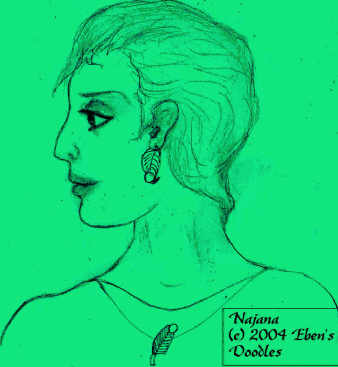
Yet, she, not Najana, held the trump card--right?
Though Heena felt like she was in the lion’s den, she knew she had something now her sister had no idea existed, and the thought gave her the boldness she needed to confront a bigger, more powerful, far more beautiful rival.
Najana had just finished an important scene with her father. As a high-spirited, spoiled, only child of his unhappy love affairs and disappointing marriages, possessing intellectual gifts and pride equaling her father’s, she had thrown his courtiers in a tizzy demanding to be allowed the freedom to marry a young count from Byzantium--though this was the Doge who was determined to destroy Venice’s arch-rival, the world’s incredibly rich queen city of Byzantium on the Bosporus.
Her features flushed with the success of her performance, she turned to confront her unexpected, totally unwanted guest
“What do you want barging in on me here?” her sister inquired with a frosty tone that contrasted violently with her high color. “If you want a part in this production, you’re wasting your time, since--”
Heena shook her head slowly, her eyes filling with the light of what she had seen, but also saddened to see, close up, the animosity between them, so alive and well after years of avoiding each other, set after set.
“I think It’s important for YOU to hear about,” Heena replied, resisting the temptation to let her sister remain in total ignorance, thereby consigning her to her personal hell of spite and rivalry and all the rest. “I’ve seen something on the “Christmas Factor” set that you need to hear about.”
Her sister turned, toying with her fingers in a bowl of roses in water. “Really? Oh, I doubt that very much. I’ve heard about the “Christmas Factor”--it isn’t what all they were saying. Maybe that is the sort of thing you feel comfortable in doing, my dear, but people like myself know--”
Heena could have blurted out, fairly, that her sister knew absolutely nothing, and that she was an icy-cold bigot, prig, and ignoramus, self-conceited, vengeful, and aggressive to the point of megalomania. But she knew it wouldn’t impress her sister, how well she defined her--Quality Control and Psych-Rehab’s files had the same profile of her, and she hadn’t minded it at all, since she thought herself perfect in her own eyes, n o matter what others said about her. With strength and character like that, so unbending and self-assured, her sister wouldn’t even flinch if she called her the worst things imaginable.
So, instead of fighting ice with fire, Heena shrugged, sat down, and simply said, “Maybe you’re right. But you really ought to take a minute when you can and check it out. Reports are one thing, seeing it with your own eyes is another.”
She went on, saying some more things in this vein, and noticed, or just sensed, a rise in temperature in her sister, a certain decline in disdain. She was “warming up” to the possibility that Heena might be on to something she knew nothing about. Of course, to an arch-rival, letting a rival enjoy any advantage is out of the question, and that alone could spur her to swallow a modicum of pride and, without admitting she might be mistaken, at least go and “check it out” when her sister wasn’t present to catch her in the act.
Heena, once finished, left the dressing room and the door open. There was no good-bye, no showing her to the door. But that did not matter now. Heena knew with all her being that she had something her sister did not. It made life worth living! But she had to have more of it! How was she to get more?
Walking over the Bridge of Sighs, she wondered if she were ever to find what her whole being ached to find.
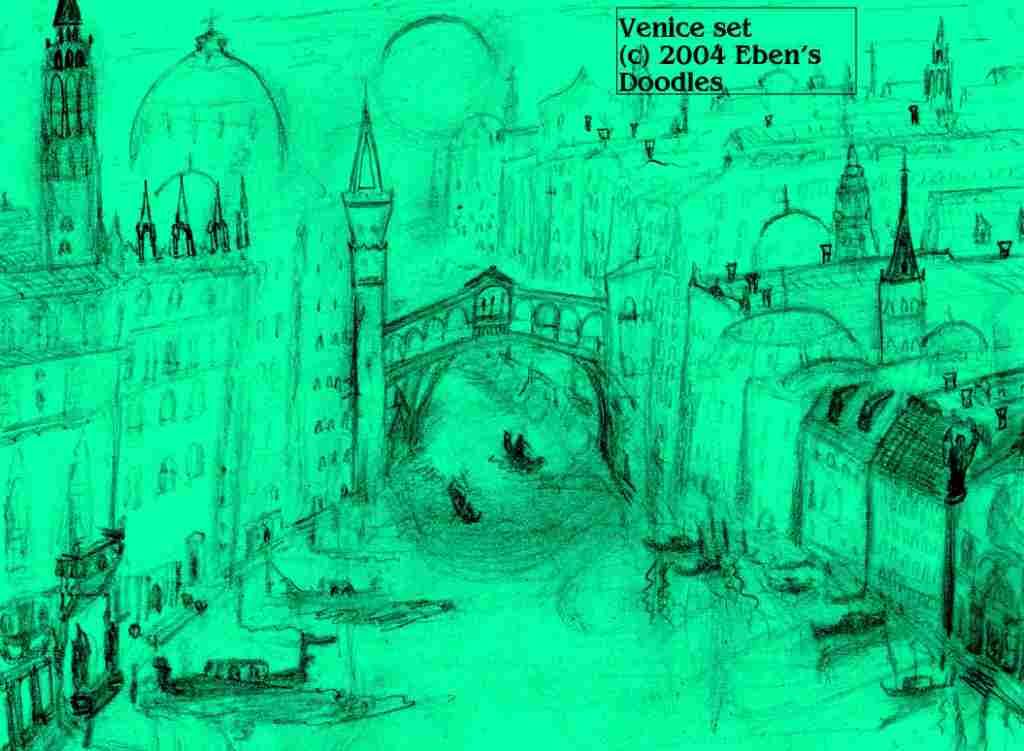
Quality Control people were running to intercept her, but she saw them in time, and eluded them temporarily by running down some steps, jumping into a gondola, and poling her way out of their reach. How fortunate for her this was Venice, so perfect a place for foiling Quality Control, she had a good chance of keeping out of their clutches! No wonder the old original was famous for its constant schemes and plots and skullduggery--the setting of maze-like canals, the islands choked with buildings that were difficult to break into without warning, there couldn’t ever be effective control, not before supercomputers and their fast-as-light quality checks on every square inch of the city, inside and out. Even now, with all that system working for them, it was very difficult and highly problematic for QC personnel to get to her.
Then it dawned on Heena as she left the gondola in another neighborhood, hurried away from the canals and stepped back into a modern transit car at a station hidden behind fake scenery. The next “Christmas Factor” file productions--they were, at present, the only way. Against the other passenger’s protests, rudely programming and commandeering the car, she soon sped off, directly back to the set and her lapsed role, hoping against hope that she could regain her succeeding part as the Messiah’s mother in “Lakota Nativity”.
Failing that, she’d have to wait for a smaller bit part in a tear-jerking period piece called “A Victorian Christmas,” where she played the mother of two little, half-starved girls. Having read the script, she didn’t want the part, but that wasn’t her option, to sit out while all the others did their part holding society together. She’d do it, but what good would it do? No, she wanted more parts playing Yeshua’s mother.
It was like nothing else. Najana could have her sophisticated, stuck-up parts, to show everyone how polished and beautiful a performance she could pull of time after time. But Yeshua’s mother?--it changed you from the inside--turning your eyes out, so to speak, so you could see yourself for thefirst time as you really were. It was horrible--seeing yourself as the evil-hearted, conceited, selfish, unforgiving, utterly corrupted thing you were--but then, after that, you could see others too and feel a measure of human feeling for them in their human condition! Her sister Najana, for example--blind since birth, and didn’t know it. always putting down, always stomping on rivals, so she might be exalted!
What will open her desperately wicked sister’s eyes to herself, so that she could be free as she herself felt free? Only the truth, Heena reflected. Only the “truth,” which she saw she had, somehow, got hold of through “Dogon Star Child.”
Heena paused as she stood on the deserted set where she had learned so much so quickly, and where her life had been, yes, “revolutionized.”
She would never again be the same, thanks to “Dogon Star Child.”
But, pulling herself up with a jolting pinch on her own arm, she needed to be going. Precious time was being wasted. “Lakota Navity” was on-line! And stage directions, left behind for lagging staff and players, said the set was located ten thousand miles or probably a full forty minutes away--on the recreated North American set.
How withdrawn and shut up within herself she had been! She saw it now. Poisoned with hate for her sister, drowned in the self-inflicted quagmire of bitterness and self-pity, she hadn’t thought straight for more fifteen or more years! No wonder why she couldn’t hear the important facts she needed to know in order to live--people were telling her, even trying to tell her, but their efforts were wasted on deaf ears!
Kicking herself mentally for her lifetime habit of cultivating disastrous, fog-brained stupidity and the way she had destroyed herself with hating and rivaling a superior sibling for years and years--how could she have assumed the set would be close by somewhere? Was there still time left in which she could turn her life around?
Her face wet flooded with tears, Heena ran toward the transit tube.



